Earlier this month I was very interested to see a series of posts on Raise the Horns about the top 25 most influential people in the birth of paganism. When I read Mankey’s post, it reinforced my own conception of Goddess spirituality as having a distinctly different lineage and flavor than much of contemporary paganism. His list, while extensive, useful, and accurate, involves a distinct lack of Goddess scholars, highlighting to me that Goddess spirituality IS a different movement and isn’t actually just a Goddess-oriented branch of contemporary paganism. Indeed, almost everyone on his list I’d either never heard of, not read, or don’t enjoy their writing. I immediately started to draft a list of my own and came up with 13 women, which seemed delightfully appropriate. We in the Goddess feminist community have our own path, herstory, and lineage, one that really only began in the 1970’s in direct connection to the feminist movement, rather than the pagan movement.
Not necessarily in a particular order, here is my own list of the top thirteen most influential people in the development and articulation of Goddess Spirituality as its own distinct path. (I’ve been scrambling to finish collecting my thoughts in time to post this list while it is still Women’s History Month!) Only one of my own picks also appears on Mankey’s list. 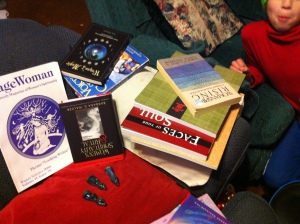
- Carol Christ–this feminist scholar is the most skillful and intelligent thealogian of the present day. Christ’s influence on my own ideas and concepts has been profound. Her work is academic, focused, and deep, and she wrestles with heavy questions. I particularly enjoy her books Rebirth of the Goddess and She Who Changes. A brilliant, thoughtful, amazing writer, Christ’s essay Why Women Need the Goddess remains, in my opinion, one of the most important and influential articles of our time.
- Merlin Stone–author of the classic When God was a Woman, this professor of art history changed the landscape and understanding of ancient cultures and their relationship to the Goddess (and, yes she drew on the work of Murray and Graves, but moved into feminist thealogy rather than pagan practice).
- Riane Eisler—author of The Chalice and the Blade, she made a significant contribution to the understanding of the history and development of patriarchy as well as offering a solution in the form of a partnership model of society.
- Marija Gimbutas—scholar and archaeologist and author of several books chronicling Goddess figurines from around the world, including The Language of the Goddess, her work has come under scrutiny and criticism, but remains a potent contribution to the lineage of the Goddess movement.
- Starhawk—the first of two on my list who bridge the gap between more “classic” paganism and feminist spirituality, Starhawk had a huge impact on the development of a female-oriented spiritual tradition. Her book The Spiral Dance was the first introduction to the Goddess for many women. In keeping with what I find to be a personal lack of click with a lot of pagan authors, I did not particularly enjoy The Spiral Dance and actually read it much later than most of the other books about feminist spirituality that I reference in this post, but regardless of personal taste, her influence on the Goddess movement is profound.
- Z. Budapest—considered by many to be one of the first mothers of the feminist spirituality movement in the U.S., like Starhawk, Z’s writings are not my personal favorite resources because of their heavy Wiccan orientation, but they are undeniably classics in Goddess circles. Z has taken heat from many pagans for her position on transgender people.
- Patricia Mongahan–recently departed author of Goddess-specific resource books like The Goddess Path and Wild Girls, Patricia’s writing is more practical and less scholarly/thealogy-oriented than some of my other favorite authors.
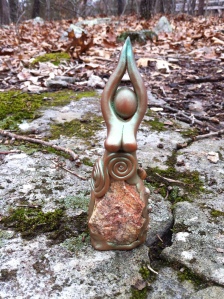
- Monica Sjoo—radical artist, ecofeminist, and Goddess scholar, Sjoo wrote The Great Cosmic Mother and one of my other favorites, a critique of New Age spiritual paths called New Age Armageddon. Her classic and awesome painting God Giving Birth narrowly avoided ended up in Court on the charge of “obscenity and blasphemy.”
- Hallie Iglehart—while less well-known and influential than some of the other women on my list, Hallie was personally very impactful to my own Goddess path, since her books were some of the first, personal and experientially-oriented Goddess-specific books that I read. She is the author of Womanspirit, a synthesis of feminism and religion, and of The Heart of the Goddess, a visually stunning collection of Goddess images and meditations/reflections.
- Cynthia Eller—while Eller’s book focused on debunking the “myth of matriarchal prehistory” made her lose popularity among many in the Goddess community (see her clarifying comments here), her scholarly engagement with the complexities of articulating the concepts of feminist spirituality and of thealogy is challenging, illuminating, and offers the opportunity to dig deeply into one’s own perspectives. Her book Living in the Lap of the Goddess is a thorough exploration of women’s spirituality and the Goddess movement.
- Charlene Spretnak–another rocking writer with a thorough grasp of the sociopolitical and cultural context, value, and purpose of Goddess spirituality, her classic anthology The Politics of Women’s Spirituality is one of the best and deepest explorations of the concepts, personal experiences, philosophies, and thealogies of why Goddess.
- Karen Tate—through her weekly radio show, Voices of the Sacred Feminine, I would venture to say that Tate is one of the most influential and dedicated “Goddess advocates” of the present day.
- Elizabeth Fisher and Shirley Ranck—authors of germinal religious education curriculums focused on feminist spirituality and woman-honoring traditions, originally published by the UU Women and Religion program, their work with Rise Up and Call Her Name andCakes for the Queen of Heaven continues to change the lives of women around the country by introducing them to a vision of what the world could be like if the divine was imaged as female.
Also deserving of mention are:
- SageWoman Magazine (and her editors)—this specifically Goddess-women oriented publication is a treasure and a delight.
- Feminism and Religion blog–daring to explore the intersection of religion, scholarship, activism, and community, FAR is not specifically Goddess-oriented, but includes Goddess scholars amongst their contributors and weaves a beautiful, living, organic tapestry of the multifaceted web of feminist spirituality in the present day.
I find that feminist spirituality can be distinguished from paganism because of the inclusion of a core sociopolitical orientation and distinct sociocultural critique. Feminist spirituality to me is the intersection of religion and politics. It is religious feminism. It may or may not include literal experience of or perception of the Goddess, but it names the female and the female body as sacred, worthy, and in need of defense and uses Goddess symbols, metaphors, stories, and experiences as primary expressions of divinity and the sacred.
After originally writing this list, I thought of many more women I should have included and I kept meaning to do a part two follow-up article. I’ve yet to finish that, but this is who I would add…
Six More Influential Women: 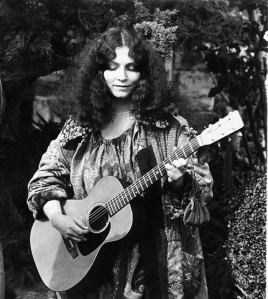
- Shekhinah Mountainwater (pictured at right): tremendous personal influence on my life and work.Original creator of Womanrunes and author of one of my all-time favorite goddess spirituality books, Ariadne’s Thread.
- Diane Stein–I particularly enjoy her anthology The Goddess Celebrates and also her book, Casting the Circle.
- Vicki Noble–her book Shakti Woman is a powerful and important read.
- Barbara Ardinger–if I had to choose a favorite book for ritual resources and goddess spirituality, her book A Woman’s Book of Rituals and Celebrations would be one of those at the top! I also enjoy interacting with her as a sister blogger at Feminism and Religion.
- Barbara Walker–author of several goddess-oriented sourcebooks, The Essential Handbook of Women’s Spirituality is another of my favorite resources.
- Nancy Vedder-Shults–I first “met” Nancy through hearing her music at a Cakes for the Queen of Heaven training. Her CD, Chants for the Queen of Heaven, was my first-ever purchase of goddess-specific music (I didn’t even know there was such a thing until hearing her songs!). Later, I continued to enjoy her contributions to SageWoman magazine and now through direct interaction on the Feminism and Religion blog.
Other cool books/honorable mentions:
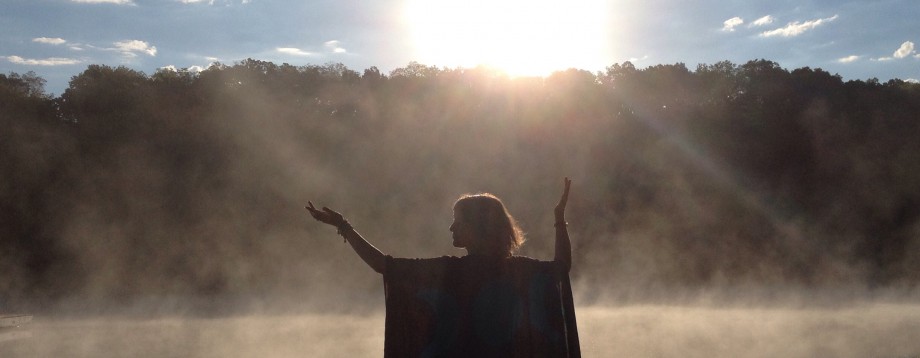
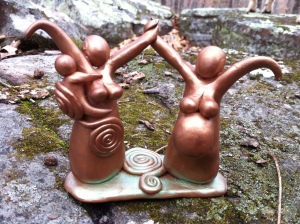


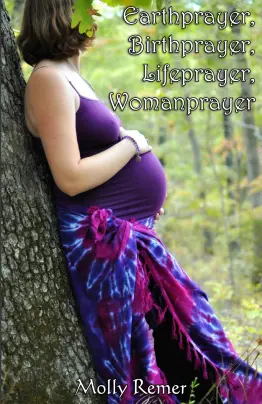
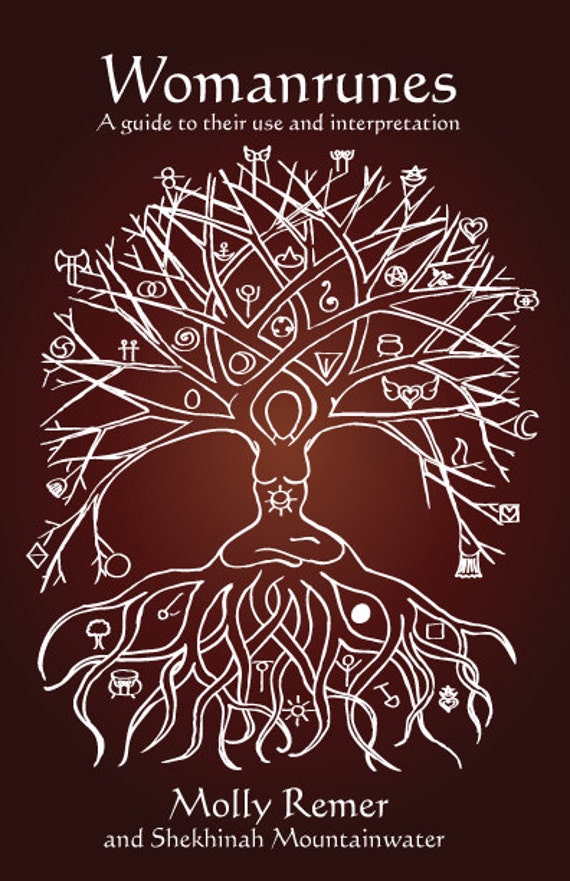


Reblogged this on Journeying to the Goddess and commented:
A most excellent list! Six of the authors are in my own personal library, a few I had not heard of before so I’ll definitely have to check these people out. Thank you talkbirth!
Thank you! 🙂
Hello TalkBirth,
Wondered if you’re interested in reviewing my next book – Goddess Calling: Inspirational Messages and Meditation of Sacred Feminine Liberation Thealogy? If so, please contact me at karentate108@ca.rr.com so I can get you a copy.
No Matilda Joslyn Gage? She almost made my list. I enjoyed this list and will be sharing it.
Thanks for sharing! I obviously need to start a to-read list because I’ve not read anything by Matilda (that I can think of).
Thank you for your writing and, I will check out some of the names I am unfamiliar with. Two things. I so honor the work of Vicki Noble. Her feminism and goddess groundedness is so strong!. Also I wonder if you know about the work of Susun Weed. Her land and her teachings are filled with The Goddess.
Matilda Joslyn Gage is from Fayetteville NY, near where I live. She was a radical feminist and understand that women would not be free until the church was dismantled.
She should be. I’ve been to the Gage house, and have quoted her in numerous papers.
Pingback: the 13 Pagans who have been influential to me | Adventures and Musings of a Hedgewitch
I would also nominate Cathryn Platine for this group as well. She almost singlehandedly brought back awareness and worship of the goddess Cybele, also known as Magna Mater in Rome. She was extremely important in the ancient world and her worship can be traced back for at least 10,000 years to neolithic Anatolia. Her widespread worship ended with the rise of Christianity although remnants of her cult persisted in parts of Europe until well into the middle ages. Yet in spite of this, she was virtually unknown in neopagan circles or written off as a “tranny” goddess before Cathryn brought her back. Cathryn’s articles can be found at http://www.gallae.com
Cool, thanks. I need to amend my post to add Shekinah Mountainwater too. I’m sad I forgot her!
I love Karen Tate’s show!
It’s amazing! 🙂
Hi TalkBirth,
One of my Voices of the Sacred Feminine listeners just brought this to my attention! Imagine my honor to be listed among my mentors! I’m going to give your blog a shout out on my radio show this week. And I hope your readers will also check out my books which have garnered some prestigious endorsements. I don’t think there’s anything out there like Sacred Places of Goddess: 108 Destinations and Walking An Ancient Path was a finalist in the spirituality category of the USA National Best Books Awards in 2008.
Sounds great! Thank YOU for all you do!
Hey. Great list. But you’re missing Francesca De Grandis who still writes and teaches.
I would like to add my gratitude and praise to the wonderful women of your list; I’ve read/studied all of them except for #13 Elizabeth Fisher, and look forward to exploring her work. Thank you and blessings to everyone who honors the Divine Feminine/Gaia … may we all be healed, loved and dwell in peace.
I’m sure you already know this, but since there wasn’t a link for Gimbutas, I thought I would share that one can buy the DVD about her life at http://www.belili.org/order.html and, of course, the Women’s Spirituality Trilogy was pivotal on my path to Goddess/Gaia. Blessings!
Thanks! I’ll add it!
Thank you for this wonderful list. I agree whole heartedly that these women (and more) have done amazing work. I was a little surprised and disappointed that Vicki Noble did not make your list. Another trailblazer for women’s spirituality since the 70’s, author of Shakti Woman and The Double Goddess, co-creator of the Mother peace tarot deck. She has been my personal heroine on this path!
I’m most definitely going to do a part two follow-up with everyone I forgot the first time!
Thanks for your mention of Vicki Noble, whose books and priestess-work in Berkeley and elsewhere have nurtured the Goddess spirituality movement. Both “Shakti Woman” and “Double Goddess” are rich with insight and Goddess energies.
I agree. Vicki Noble was as powerful an influence as many of these women and more than some. Shekinah Moutainwater was another early leader, very influential on later teachers.
Shekhinah Mountainwater should most definitely also be on this list. While not a BNP (Big Name Pagan), she made huge advances and opened doors for many many women in the womanspirit movement. She wrote Ariadne’s Thread, many Goddess songs and myths, and created several divination systems. http://www.shekhinah.net Great list and thanks for shining the light on some of the Goddess movements unique foundation.
Absolutely! I’m horrified I overlooked her, because she was a formative influence on my own practices. I’m on a trip right now and I have Ariadne’s Thread with me right now actually! 🙂 I have written other posts about her actually. If you search the page, you’ll see and ode to her actually! Love her stuff! 🙂
🙂 She was very important to me as well and we were very close. She never really got the respect and recognition that she deserved, so I try to keep her name out there. The Thread is so inspiring, enjoy!
YES! Shekhinah was a profound influence for me as well. Thank you.
On my unpublished follow-up draft post are the following:
Shekhinah Mountainwater
Diane Stein
Vicki Noble
Barbara Ardinger
Barbara Walker
Nancy Vedder-Shultz
Better get to work on it! 🙂
Shekhinah missed out on a lot of recognition while she was alive. Circle of Aradia’s former priestess, Ruth Barrett (another amazing teacher and writer), has been helping to make people aware of the oversight. Ruth also has a crowdfunded anthology coming out. http://www.femaleerasure.com
Reblogged this on PAGAN REPUBLICANS and commented:
I thought this was interesting selection of individuals picked for this list.
A couple more honorable mentions: Dianne Stein (my copy of her “Crafting the Circle” is thoroughly dogeared), Jade from RCG-I (who else remembers looking forward to getting “Of a Like Mind” in their mailbox?), De-Anna Alba (both for her book and for “Solitary” magazine).
More good additions! I love Stein’s The Goddess Celebrates. 🙂
Jade River, author of “To Know,” founder of “The Re-Formed Congregation of the Goddess, and writer and publisher of the former “Of a Like Mind”, http://lgbtran.org/Interview.aspx?ID=9 and http://www.rcgi.org/
Ruth Barrett, author of “Women’s Rites, Women’s Mysteries,” gifted singer/musician/songwriter (Parthenogenesis, The Year is a Dancing Woman I & II . . . ), co-founder of The Temple of Diana. http://www.templeofdiana.org/ruth.htm
What a fascinating list! Thank you — I’ve got more women authors to find and read up on now.
I see someone has already mentioned Vicki Noble in the comments. You might be interested to hear that Charlene Spretnak is also one of the co-founders of the US branch of the Green Party — talk about really walking your talk! She’s an absolutely amazing woman, too: soft-spoken, startlingly brilliant, with a delightfully dry sense of humor — and it all shows in her most recent book, Relational Reality. She’s one of the tiny handful of women I know who invariably stretch my brain and marvelously rock my world every time I hear her talk.
I have that book on my shelf, but haven’t read it yet! Her Politics book really stretched my brain for sure. 🙂
Posted your list to my Facebook book page (http://www.facebook.com/GoddessSpiralhc). Love your blog as well! Will definitely be coming around to check out your posts. Thank you for sharing your art as well!
🙂 Paola
http://www.GoddessSpiral.com
Hi again, talkbirth — thought you might be interested to know there’s some discussion of your “Top Thirteen Most Influential People in Goddess Spirituality” on a mailing list I’m on. Interestingly, most everyone agrees with all but one of your selections. While there are some who believe Cynthia Eller should be listed because they feel we should be aware of critics of our field, there are many who also feel she has no place on such a list. I thought you might be interested in hearing the arguments against listing Eller, so I have received permission to re-print the following for you here.
Spyke is head-down in dissertation work currently, which is why she has allowed me to post this here for her — I have added only a few grammatical corrections. Also, while her tone may seem a bit terse, I assure you that is not directed at you; she was replying to a statement on the mailing list. The other reason I am posting this is, of course, because I agree with her, and I think friendly discussion is beneficial for all of us. I hope you find it interesting as well — enjoy! 🙂
“I agree with you in theory. I know that we women’s spirituality scholars are like Ginger Rogers who had to dance in high heels and backwards. We have been automatically marginalized even when our scholarship exceeds the standards of our counterparts in other fields. We tend to know the arguments against our work, and then pave new roads without the parades.
“That is not my problem with Eller. Unpacking her arguments is child’s play for us by now; I am thinking of the best at this — Marguerite Rigoglioso and Joan Marler. What I am saying is that she enjoys recognition for being a major part of a movement that she only pseudo-critiqued, and didn’t really research, and then intentionally marginalized with the rest of the dog-pack patriarchal academy — and she did it for attention. She is not a sister with worthy scholarship and a different point of view — IMO that would be somebody of the caliber of Rosemary Radford Ruether. Eller merely jumped on the anti-Gimbutas bandwagon and joined in the efforts to dis-empower women’s spirituality scholars by calling them hysterical, pollyanna, anti-intellectual. She benefited from this patriarchal tactic, and now I see that that tactic worked — because someone out of academy thought she was a leader of this movement.
“On saying that, the other person that deserves to be on the dream list is Max Dashu, even though she is more a master of oral tradition rather than writing papers. She deserves a spot in Women’s Spirituality Valhalla.
“Blessings in these dark times. Spyke”
I love love love this post! I found it through my SageWoman and the article on Marlaina Donato that was sent out through email. Thanks so much for all of the great new inspiration and authors to check out.
Thank you! I’m glad to have offered the suggestions! 🙂
Don’t forget, Max Dashu. http://suppressedhistories.net/
Great article, was thrilled to see Carol Christ’s name on the top of the list. I too love her work and consider her one of the greatest influences on my life so far. I write for feminism and religion so I was just as happy to see them listed as influential on the Goddess spirituality movement also. The article resonated with me as once upon a time I identified as a Pagan and for the reasons outlined above, I no longer feel it is appropriate for me. My bookshelf is made up with books by nearly all of the authors listed. I would have also added Rosemary Ruether. Thankyou.
Pingback: Book Review: Goddess Calling | WoodsPriestess
Pingback: Book Review (OT): Goddess Calling
Pingback: 10 Important Druids
Pingback: 10 Important Traditional Witches
I would have loved to see on the is list Jhenah Telyndru with her work creating the Sisterhood of Avalon her book “Avalon within” is a worthy read and the Sisterhood nearing its twentieth year is now spread throughout all the continents worldwide and is growing.
I am actually reading Avalon Within currently. Have never read it before!
Reblogged this on She Who Is.
Reblogged this on Divine Felicity.
Nice work. 🙂 I’m amused to note that I’ve never heard of the second half of your list, which does not include Morning Glory Zell-Ravenheart, Alison Harlow, nor yet Shekhinah Mountainwater or Dianne Stein. Thus is it demonstrated the somewhat splintered nature of this path. We each only find what we can find, and whose books/work are well known or available where can vary by geography as well as philosophy. Then factor in the differences between fame and influence… Ruth Barrett is a good one too, she really lives the Goddess in the day to day. 🙂
I love Shekhinah Mountainwater and have all kinds of posts influenced by her work–however, in terms of “most influential,” she is not as widely read/known as many of the others. Ruth Barrett and Diane Stein are also great (though I’m not into Morning Glory) and I very much enjoy their books. Just because they aren’t on my initial list, doesn’t mean I haven’t heard of or read them! 🙂 I think it might be time for a part 2!
I actually think I have a part 2 saved in my drafts. I should dig it up! I wrote this original post quite some time ago!
Pingback: Top Thirteen Most Influential People in Goddess Spirituality | Adventures of a Barefoot Bohemian
I have also benefited richly from the work of Vicki Noble, Anne Baring and Jules Cashford, and Dr Jean Bolen.
Riane Eisler (Chalice and the Blade) and Merlin Stone (When God Was a Woman) are responsible for my being on this path! Riane Eisler continues to inspire with her social justice activism and women’s empowerment work.
Pingback: 10 Important Women in Goddess Spirituality
I’m so happy to see other names suggested in the comments. Thank Goddess for each one! Here’s another worthy woman, Mary Daly. Her books, Gyn/Ecology, Webster’s First New Intergalactic Wickedary of the English Language, Beyond God the Father, and The Church and the Second Sex were all life changers for me. I had the pleasure of hearing her speak on the Goddess and she was a dynamo! A sharp mind, fearless voice and wickedly funny!
Thank you! Yes, absolutely – Mary Daly!
Sonia Johnson wrote a tribute to Mary Daly called The SisterWitch Conspiracy which might be of interest to her readers, especially fans of Quintessence. Johnson’s vision extends beyond what might be called Goddess consciousness (she is even critical of some practitioners she’s met), but pulls forward Mary Daly’s visionary imagination of Nature beyond domination. I count both SisterWitch and Quintessence as part of my collection of eco-visionary writing.
Great list! I would add author Barbara Walker, artist Nancy Blair and Jungian analyst and author Sylvia Brintin Perera — she changed my life — plus author Vicki Noble.
I would like to see Jade River included, and mention of the 3000 member Reformed congregation of the Goddess, as well as Of a Like Mind, one of the first goddess publications.
I’ve been meaning to do a Part 2 post for at least two years now!
Demetra George is also one to mention
I agree that Thirteen is a fine number :~) but maybe the number of contributors to this field justifies a longer list of Grand Mothers, the wise women who have been nurturing women’s spirituality and Goddess celebration and Goddess studies? Elinor Gadon who wrote the superb “The Once and Future Goddess” comes to mind. Judy Chicago and her evolutionary “The Dinner Party” with its gorgeous visual richness honoring Source and the Goddess is another. I know that some people will disagree with my suggestion that Lynn Andrews also contributed to this movement, (because inevitably, we will and do have contrasting experiences and viewpoints) but she has been a powerful teacher and nurturer for me and others in this area of spiritual healing and growth. And where oh where is the fabulous Dr Jean Bolen?
Absolutely! I’ve had a draft post of “thirteen more influential women” in my drafts folder for two years now. I need to finally finish it! 😊
Oh, excellent! Thanks for your reply.
I am grateful that i placed sixth on this list,but why is my name the only one written in black?And why is it important to add that the selecter of these names is “not fond of Wicca” when it was the old religion that held on to the Goddess most strongly and at tremendous cost to the lives of women, witches or not. When i have started the Goddess Movement this field was bare. Along with my Holy Book of Women’s Mysteries, there was Merlin Stone who just published the Paradise papers in the UK, later renamed When God was a woman. Carol Christ was still in school, Gimbutes was coming out with her first book called Gods and Goddesses of ancient Europe, we talked her into reversing it to say Goddess first.
And most of all after all these fifty years of working live circles, traveling all over the country and Europe why is it important to mention,( hence keep the gossip alive,)that i was under cyberattack by the Mens Rights Activists, hiding behind the transexual community. I was far more attacked by the Born again christians ,a relentless attacks for many years. Mary Daly was still talking about god but coming closer to the truth, a great thinker and teacher. Starhawk was coming up in an other five years.
The selecter of these names was living under a rock or just near a library. The living faith, the living raising energy of women is the most important contribution you cannot learn from books. We must put together an other list, with fifty names(A full teaching coven) and by somebody who lived the Goddess Movement not just read about it.
And write my name in the same color as the rest.
Z, I am confused as to why you would shame another woman, who has given freely of herself, to help spread the wisdom of the Goddess Spirituality movement. I know Molly (the author of this post that you say must live under a rock) to be a dedicated priestess and advocate for women. She is a part of the newer priestesses working to keep the tradition alive. Don’t we have enough shame and belittling to deal with, without it also coming from one of the foremothers of the movement?
I hear your concern for holding the history of the movement. I also hear a concern for your own reputation and place within that history. Z, no one doubts your work in the founding of Goddess movement in the US. It is a living tradition, and so it is going to require new priestesses and many people, just as it always has. It is going to grow and change, as all living things do. Is this not what you hoped for? Worked for?
Is it really so important to have your name be the first on every list?
Seeing you write these things brings sadness to my heart. I am sad that someone who worked so hard to birth something, can not let her child go to grow and live the way it will. But you can not hold back life. I am sorry to see this causes you suffering.
Also, I checked on multiple devices and did not see your name in a different color. Maybe Molly changed it, but I don’t recall it being different the first time I read this. Regardless, formatting blogs can be a real pain sometimes, and I am quite sure it was nothing personal.
Perhaps you could write a list of the most influential women as you remember it? Or maybe we could just stop making lists, as they always seem to hurt someone’s feelings, and are a bit hierarchical by nature.
The only color difference comes from which links have been clicked on or not. I couldn’t think of how to address that without coming across as unnecessarily snarky, so I haven’t replied!
This list was actually primarily intended as a resource for others (as well as recognition of the many wonderful contributions that have come through this “thread” of the weaving, so to speak), not as definitive. I still have a part 2 languishing in my drafts folder because there are SO many wonderful influences to include!
I also note at the beginning of the post that my list is not in order of importance, but rather, a collection of sources influential to me and to the movement as I have experienced, as someone who is in a later “wave” but is inspired ad guided by the lineage and wisdom of these foremothers and wayshowers.
Thank you so much (from my heart), Syren, for your beautiful comment here. It expresses and exemplifies just the kind of compassion I have yearned for within feminism and feminist spirituality, and it also moves us forward in our ongoing education. The unfolding, reciprocal sharing of information and wisdom is crucial because of course none of us knows it all and nobody owns the Goddess. I’ve often noticed though, how I and other women and also some men do seem to hold within this impulse toward, and effort to assert, ownership. It is interesting, and certainly reflects the passion in all our souls for spiritual nourishment – as well as the deprivation that has been a norm in patriarchal cultures. I love your suggestion to Z, to create a collection of the influences that shaped her and enabled her to make such an extraordinary contribution to the evolution of us all. I would love to see that gathering of powerful shaping elements that helped Z to give so much! `Obviously any such collection will be individual – I noticed that some of the names were ones I don’t know although I’m fairly conversant – and some of the people I would include (for instance, Hallie Iglehart Austin who nurtured my soul so richly) aren’t mentioned. I too would like to thank and acknowledge Molly, as well as Z, for their wonderful Goddessy generosity and power to nourish this vital movement. Blessed Be!
Thank you, Esther and Syren, both…beautiful responses. Esther, I particularly appreciated your comment that, “nobody owns the Goddess. I’ve often noticed though, how I and other women and also some men do seem to hold within this impulse toward, and effort to assert, ownership.” This is often what happens, isn’t it? I’m deep into a religious research project and this “ownership” of the Divine is apparent in most religions; I had thought — hoped — that it was primarily those derived of patriarchy (the Abrahamic faiths are especially caught up in the view that only they truly know the Divine) and was saddened to see Z’s post. However, your response and that of Syren have restored my faith; we must allow Goddess to flow through us without trying to control or own Her. Blessings!
Reblogged this on Wolf and Raven.
Kathy Jones, UK, who started the first Glastonbury Goddess Conference in 1996, which still continues every year, whose training has birthed conferences, classes and circles worldwide, and whose books are classics in the field, deserves to be on this list.
Good suggestion! I love her Priestess of Avalon, Priestess of the Goddess book.